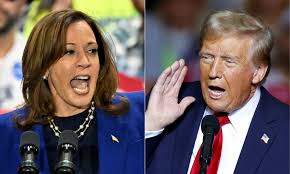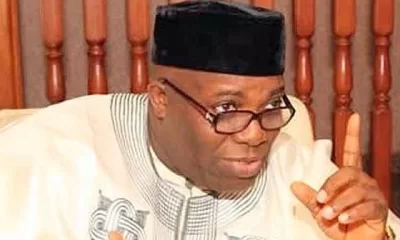Top Stories
Why Kamala Harris Lost and How Donald Trump Won: A Deep Analysis of the 2024 US Election

By Ifeanyi Abraham
Today I am mourning, but this too shall favour me—Donald Trump’s victory and Kamala Harris’s loss carry lessons for us all. She joined the race just 107 days ago, facing a former president who began his campaign journey nearly eight years prior. No easy feat.
In 2016, I wrote an article for HuffPost titled ‘Five Quick Lessons From The 2016 US Election Results – What A Donald Trump Win Tells Us.’ Back then, I explored what a Trump victory signified for democracy and how it reflected the people’s power to rise above societal expectations and media narratives. Democracy, in its raw form, had spoken, and I accepted the results as a lesson in the resilience of choice—even when those choices may be bewildering to some.
As I process the loss of Kamala Harris in this election, I find myself in a familiar place. Only this time, my feelings are deeper, more personal. I was wholeheartedly pro-Kamala because I believed her ascent to the highest office was an opportunity for the United States to rise above its historical misogyny, to embrace progress, and to validate the dreams of countless women and people of color who see themselves reflected in her story.
Losing this chance feels like a setback. But, as I reminded myself in 2016, democracy sometimes challenges us to accept results we did not expect or want. Yet, in every loss, there is a lesson, a seed of transformation waiting to bloom.
The journey toward equality and justice is never a straight line. And while today’s results may not reflect the progress we hoped for, they do not erase the strides made or the path forward. Kamala’s impact, her vision, and her voice remain, and so does the fight for an America that lives up to its ideals.
So where did things go wrong, and why, despite everything stacked against him, did Donald Trump manage to secure a win once more?”
Where Kamala Might Have Gotten It Wrong
1. Disconnect with Key Voter Concerns: Kamala’s campaign leaned heavily into issues like reproductive rights, social justice, and healthcare reform. While these are undeniably important to many Americans, they may not have resonated as strongly with voters whose primary concerns were economic stability, national security, and border control. With rising inflation, job insecurity, and worries over crime, many Americans felt an acute need for economic and personal security. In contrast, Kamala’s emphasis on progressive social policies may have seemed less relevant or even disconnected from these immediate, everyday concerns. Furthermore, her focus on issues that resonate with urban and coastal areas may have alienated rural and working-class voters, who felt overlooked or misunderstood by the campaign.
2. The Elon Musk, X, and Former Democrats Factor: The influence of figures like Elon Musk, along with platforms like X (formerly Twitter), created a new dynamic in the political landscape. Musk’s outspoken criticisms of progressive policies and endorsement of more centrist or libertarian values resonated with former Democrats and independents who had grown disillusioned with the party’s direction. His support for free speech and critique of “woke” culture resonated with voters who felt that the Democratic Party had strayed too far left. Musk’s platform, X, became a prominent space for these discussions, amplifying voices that criticized Harris and the Democratic establishment.
3. Concerns Around Her Perception of Ascension: When President Biden stepped aside, Kamala Harris was swiftly positioned as the natural successor—a move that came with both benefits and pitfalls. While it solidified her as the party’s standard-bearer, it also raised questions about whether the Democrats had shielded Biden’s health and cognitive issues for too long. Some voters felt blindsided, questioning the transparency of the administration. The rapid transition to Kamala’s candidacy, though understandable given the need to rally quickly, left little room for a thorough exploration of alternative Democratic candidates who might have appealed to a broader base.
This accelerated timeline and sense of inevitability surrounding Kamala’s candidacy may have alienated voters who prefer a primary process that gives a wider field a fair shot. With other Democratic contenders overlooked or sidelined, some voters felt that the party’s decision was more about maintaining the status quo than refreshing its leadership. As a result, Kamala’s campaign began with a perception of entitlement—an “ascension” rather than a competitive win—leaving her vulnerable to criticisms of being out of touch with everyday Americans who valued humility and felt their voices weren’t fully considered in the process.
4. Perceptions of Competence and Authenticity: Kamala’s past as a prosecutor brought mixed perceptions. For some, her record on criminal justice issues conflicted with her progressive stances, leading to questions of authenticity. The “top cop” label, often used by critics, created an image that didn’t align seamlessly with the values of the Democratic Party’s left-leaning base, who prioritize criminal justice reform. Simultaneously, accusations of being “out of touch” with working-class Americans added to this perception. Even though she grew more effective as she campaigned, her initial challenges in relating to middle America and rural voters left a lasting impression.
5. The Jill Stein, Nikki Haley, and Independents Factor: The presence of independent and third-party candidates such as Jill Stein and Republican Nikki Haley introduced new dynamics that complicated Kamala’s campaign. Candidates like Stein appealed to disenchanted progressives who felt that Kamala was not progressive enough, pulling votes from the left. Meanwhile, Nikki Haley’s appeal to moderate conservatives and independents added pressure from the right, attracting voters who valued a more measured conservative approach. This splitting of the voter base on both sides left Kamala with less room to consolidate support, especially among independents who were disillusioned with the Democratic and Republican establishments alike.
6. Electability and Gender Bias: Kamala faced a persistent double standard, rooted in deeply ingrained biases about gender and leadership. Women in politics are often held to a higher standard of “likability” and perceived strength. Kamala, in particular, faced questions about her ability to handle the presidency with the same assertiveness traditionally expected of male candidates. Voters may have unfairly scrutinised her for appearing “too ambitious” or not “tough enough,” a criticism rarely levelled at her male counterparts. This bias not only influenced perceptions of her competence but also played into narratives that questioned her ability to lead in times of crisis.


 Entertainment16 hours ago
Entertainment16 hours agoOlajumoke Onibread Gets New Opportunity In Life, Takes Fresh Move…(Videos)

 News15 hours ago
News15 hours agoMan found d3ad in Ogun hotel room four days after arriving from U.S

 Politics6 hours ago
Politics6 hours agoOhanaeze Ndigbo Reveals Speaks On What Simon Ekpa’s Arrest Means For Igbo Nation

 Top Stories16 hours ago
Top Stories16 hours agoEmbattled UNIZIK VC Rejects President Tinubu’s Sack,Gives Reason

 Entertainment16 hours ago
Entertainment16 hours agoItalian village offers $1 houses to Americans fleeing Donald Trump

 Top Stories6 hours ago
Top Stories6 hours ago2023 Presidential Poll Not Rigged – Okupe To Peter Obi

 Top Stories14 hours ago
Top Stories14 hours agoReevaluate your economic policies….they have worsened lives of Nigerians – ACF tells President Tinubu

 News15 hours ago
News15 hours agoNEWSPAPER HEADLINES FOR THURSDAY 21ST NOVEMBER 2024






